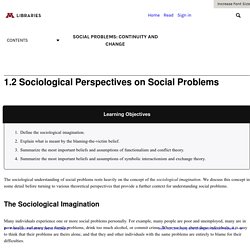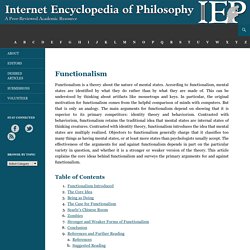

1.3B: The Functionalist Perspective - Social Sci LibreTexts. 1.2 Sociological Perspectives on Social Problems – Social Problems: Continuity and Change. Learning Objectives Define the sociological imagination.Explain what is meant by the blaming-the-victim belief.Summarize the most important beliefs and assumptions of functionalism and conflict theory.Summarize the most important beliefs and assumptions of symbolic interactionism and exchange theory.

The sociological understanding of social problems rests heavily on the concept of the sociological imagination. We discuss this concept in some detail before turning to various theoretical perspectives that provide a further context for understanding social problems. The Sociological Imagination Many individuals experience one or more social problems personally. Sociology takes a different approach, as it stresses that individual problems are often rooted in problems stemming from aspects of society itself.
To illustrate Mills’s viewpoint, let’s use our sociological imaginations to understand some contemporary social problems. Another social problem is eating disorders. Tir 15 02 01 bankston. Functionalism. Functionalism is a theory about the nature of mental states.

According to functionalism, mental states are identified by what they do rather than by what they are made of. This can be understood by thinking about artifacts like mousetraps and keys. In particular, the original motivation for functionalism comes from the helpful comparison of minds with computers. But that is only an analogy. The main arguments for functionalism depend on showing that it is superior to its primary competitors: identity theory and behaviorism. Functionalism. 1.

What is Functionalism? Functionalism is the doctrine that what makes something a thought, desire, pain (or any other type of mental state) depends not on its internal constitution, but solely on its function, or the role it plays, in the cognitive system of which it is a part. More precisely, functionalist theories take the identity of a mental state to be determined by its causal relations to sensory stimulations, other mental states, and behavior. For (an avowedly simplistic) example, a functionalist theory might characterize pain as a state that tends to be caused by bodily injury, to produce the belief that something is wrong with the body and the desire to be out of that state, to produce anxiety, and, in the absence of any stronger, conflicting desires, to cause wincing or moaning. According to this theory, all and only creatures with internal states that meet these conditions, or play these roles, are capable of being in pain.
Functionalism (video) History, Ideology, & Examples. Marxism, a body of doctrine developed by Karl Marx and, to a lesser extent, by Friedrich Engels in the mid-19th century. It originally consisted of three related ideas: a philosophical anthropology, a theory of history, and an economic and political program. There is also Marxism as it has been understood and practiced by the various socialist movements, particularly before 1914. Then there is Soviet Marxism as worked out by Vladimir Ilich Lenin and modified by Joseph Stalin, which under the name of Marxism-Leninism (see Leninism) became the doctrine of the communist parties set up after the Russian Revolution (1917).
Offshoots of this included Marxism as interpreted by the anti-Stalinist Leon Trotsky and his followers, Mao Zedong’s Chinese variant of Marxism-Leninism, and various Marxisms in the developing world. The thought of Karl Marx The written work of Marx cannot be reduced to a philosophy, much less to a philosophical system. Historical materialism. History, Ideology, & Examples. 1.3D: The Symbolic Interactionist Perspective - Social Sci LibreTexts. MarilynHowardPaper. International Social Justice Commission: A Social Justice Perspective on Poverty.
It is commonly cited that well over one billion people must survive on less than US$1.25 a day1.

Intermittent natural disasters and armed conflicts rightfully break our hearts and inspire collective acts and outcries of compassion. Yet children die, literally in their tens of thousands, every single day – simply because they are born into situations where their parents have no opportunities to adequately provide for their health and well-being2. The extreme deprivation of such a large proportion of the world’s population, in a world with more than enough resources to cover everyone’s basic needs, is a grave injustice. As followers of Jesus, we are compelled to address the issue. Living out our Biblical mandate means, among other things, that we must tackle the issue of extreme global poverty. The United Nations’ Millennium Development Goal 13 aspires to a significant contribution towards “eradicating extreme poverty and hunger.”
Understanding Poverty – Measuring Poverty Conclusions.